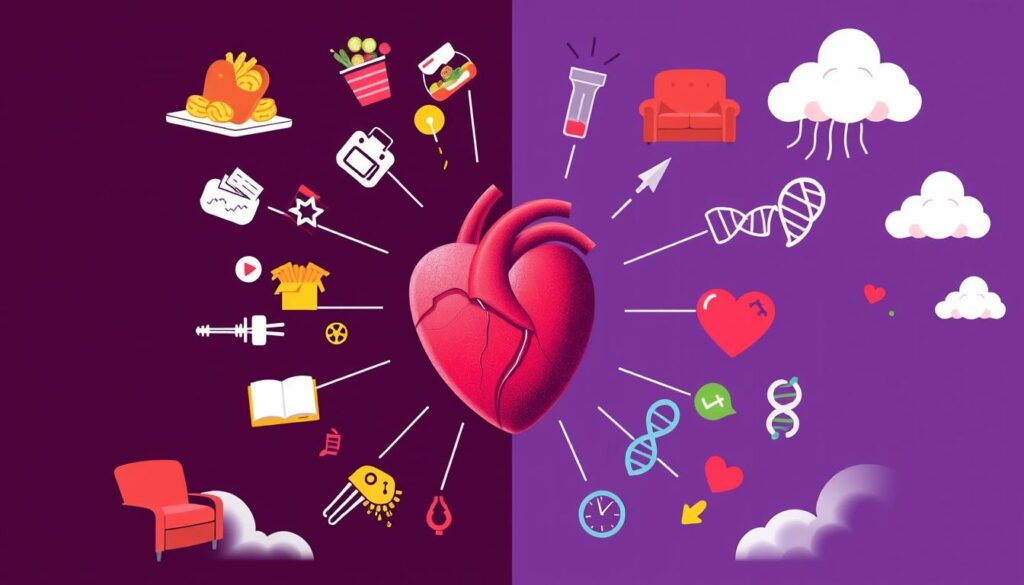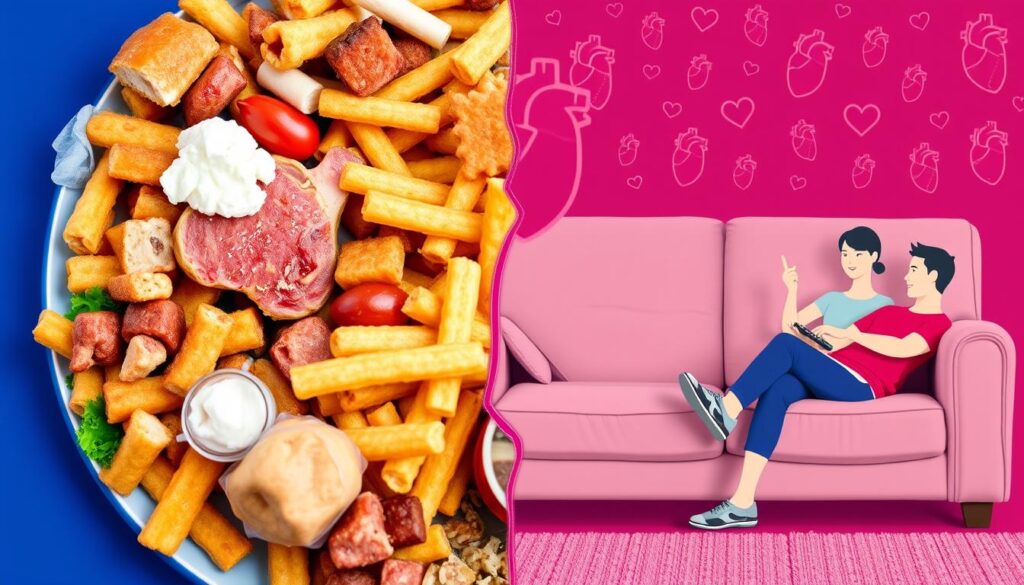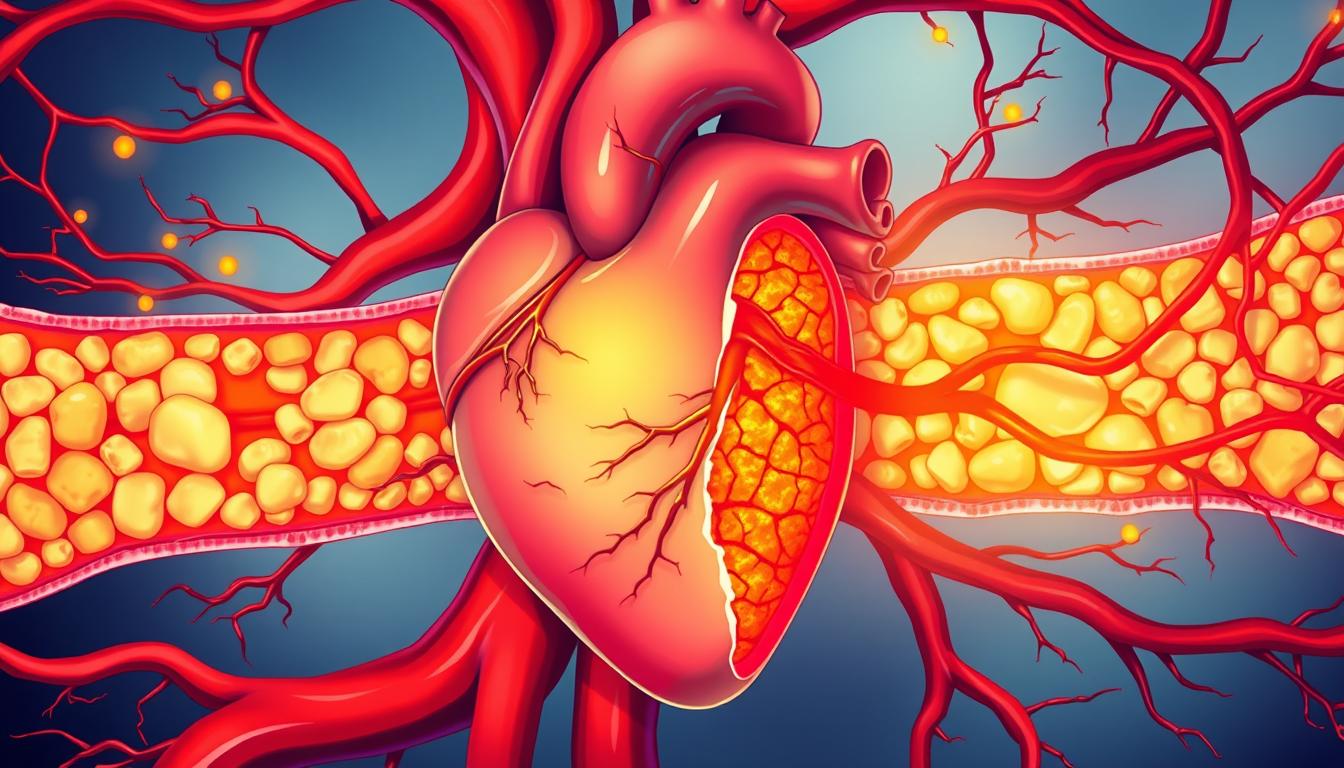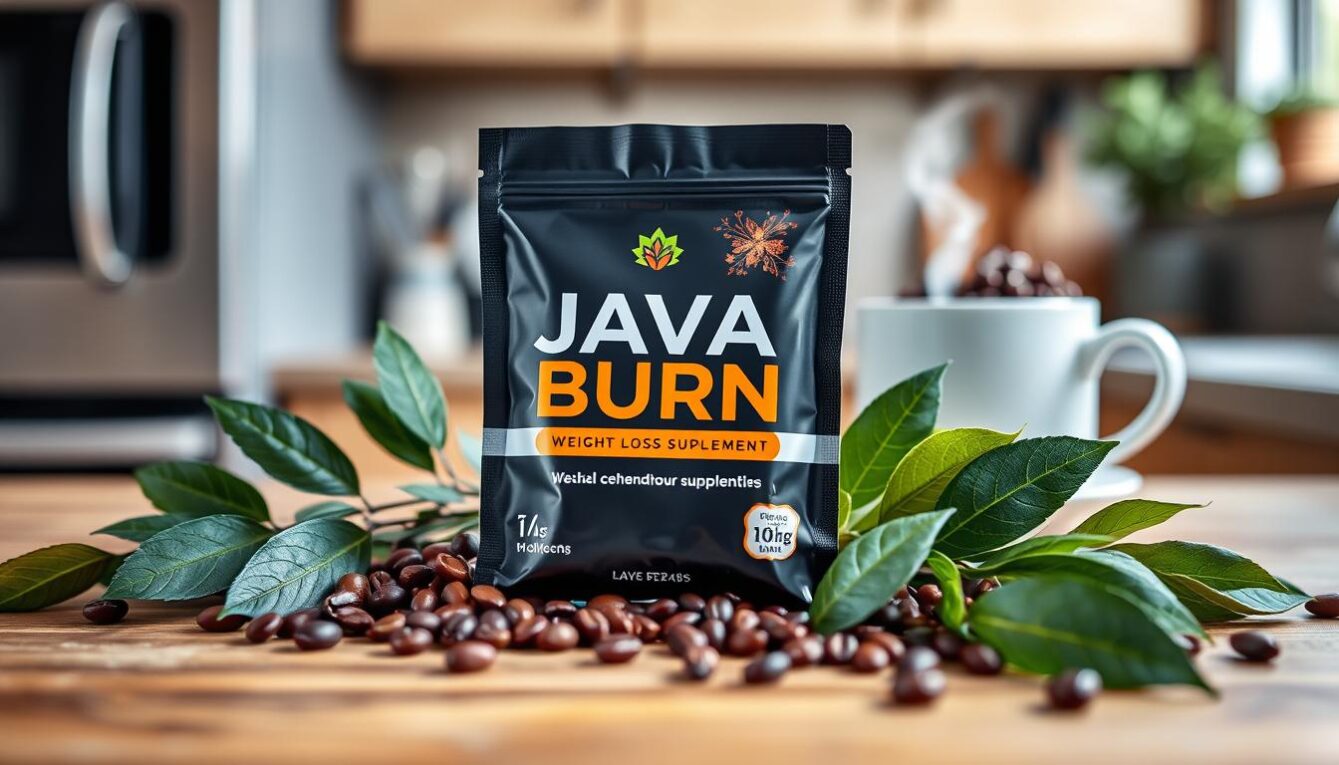Ever wondered why doctors stress about your cholesterol levels? It’s not just a number. High cholesterol is a silent danger that can harm your heart. But what does it mean, and why should you worry?
Your body needs cholesterol for cell building and making vitamins and hormones. But high levels can clog your arteries, raising heart disease risk. It’s key to understand and manage your cholesterol for heart health.
In this guide, we’ll explore high cholesterol, its effects, and what you can do. We’ll cover reading your cholesterol numbers, making lifestyle changes, and treatment options. Let’s work together towards better heart health.
Key Takeaways
- High cholesterol is a major risk factor for heart disease
- Understanding different types of cholesterol is crucial for heart health
- Regular cholesterol checks are essential for early detection
- Lifestyle changes can significantly impact cholesterol levels
- Diet and exercise play key roles in managing high cholesterol
- Medications may be necessary when lifestyle changes aren’t enough
Understanding Cholesterol: The Good, the Bad, and the Ugly
Cholesterol isn’t all bad. Your body needs it to work right. Let’s look at the different types and their roles in your health.
What is Cholesterol?
Cholesterol is a waxy substance in your blood. It’s key for making cell membranes and hormones. Your liver makes enough, but you also get it from foods like eggs and meat.
https://www.youtube.com/watch?v=0U7YHRW5dyc
LDL vs. HDL Cholesterol
LDL cholesterol is called “bad” cholesterol. It can clog your arteries, raising heart disease risk. HDL cholesterol, or “good” cholesterol, helps clear out other cholesterol.
| Type | Nickname | Effect on Health |
|---|---|---|
| LDL cholesterol | “Bad” cholesterol | Can build up in arteries |
| HDL cholesterol | “Good” cholesterol | Helps remove other cholesterol |
Triglycerides and Their Role
Triglycerides are fats in your blood. High levels can lead to artery buildup. They’re checked with cholesterol in a lipid panel. Too many calories, especially from sugar and alcohol, can increase triglycerides.
“Understanding your cholesterol numbers is key to maintaining heart health. It’s not just about total cholesterol, but the balance between different types.”
The Silent Threat: Why High Cholesterol Matters

High cholesterol is often hidden, making it a silent danger to your heart health. You might feel fine, not knowing the risks in your blood. This hidden nature makes it especially dangerous.
High cholesterol can cause serious heart disease if not treated. It’s vital to know the risks and take steps to protect yourself. Regular health checks and blood tests help catch and manage it early.
Your heart health is too important to ignore. Don’t let high cholesterol sneak up on you.
High cholesterol leads to plaque buildup in your arteries, known as atherosclerosis. This makes your blood vessels narrow, raising the risk of heart attacks and strokes. The effects on your heart can be severe and long-lasting.
| Cholesterol Level | Risk Category | Recommended Action |
|---|---|---|
| Less than 200 mg/dL | Desirable | Maintain healthy lifestyle |
| 200-239 mg/dL | Borderline High | Lifestyle changes, possible medication |
| 240 mg/dL and above | High | Immediate medical attention, lifestyle changes, medication |
Knowing your cholesterol levels is crucial for heart health. By tackling high cholesterol early, you can lower your heart disease risk and boost your health.
Decoding Your Cholesterol Numbers: What’s Normal and What’s Not
Understanding your cholesterol levels is key for heart health. Let’s explore what these numbers mean and how often you should test them.
Ideal Cholesterol Levels
Knowing your ideal cholesterol levels is important for your health. Here’s a quick guide to what’s considered healthy:
| Cholesterol Type | Ideal Level (mg/dL) |
|---|---|
| Total Cholesterol | Less than 200 |
| LDL (Bad) Cholesterol | Less than 100 |
| HDL (Good) Cholesterol | 60 or higher |
| Triglycerides | Less than 150 |
When to Be Concerned
If your cholesterol levels are off, it’s time to act. High LDL or low HDL cholesterol raises heart disease risk. Talk to your doctor about diet, exercise, or medication to improve your numbers.
Frequency of Cholesterol Testing
Regular cholesterol tests are vital for health. Adults should test every 4-6 years. If you have risk factors like family history or diabetes, your doctor might suggest more tests. Kids should have their first test at 9-11 and again at 17-21.
Knowing your cholesterol levels helps you make better health choices. Don’t miss your cholesterol testing appointments – they could save your life.
Risk Factors for High Cholesterol

Knowing the risk factors for high cholesterol is key to staying healthy. Your lifestyle greatly affects your cholesterol levels. Eating foods high in saturated and trans fats can raise your cholesterol.
Being inactive is another big factor. Exercise boosts your HDL (good) cholesterol and lowers LDL (bad) cholesterol. Smoking harms your lungs and lowers HDL cholesterol, raising heart disease risk.
Genetic predisposition is something you can’t change. If your family has high cholesterol, you might too. Age and gender also matter – men over 45 and women over 55 are at higher risk.
- Obesity
- Excessive alcohol consumption
- Certain medical conditions (diabetes, liver disease)
These factors can also raise your cholesterol levels. By knowing your risk profile, you can change what you can and work with your doctor on what you can’t.
“Your genes load the gun, but your lifestyle pulls the trigger.”
This saying highlights the role of genes and lifestyle in cholesterol levels. You can’t change your genes, but you can improve your diet and lifestyle to keep cholesterol healthy.
The Link Between High Cholesterol and Heart Disease
High cholesterol is a big factor in heart disease. Knowing this can help you protect your heart.
Atherosclerosis Explained
Atherosclerosis makes arteries narrow and hard. This happens when plaque, made of cholesterol and fat, builds up. This buildup can block blood flow and cause serious problems.
Heart Attack and Stroke Risk
High cholesterol raises your risk of heart attacks and strokes. If the plaque bursts, it can block blood flow. This can lead to a heart attack or stroke.
Other Cardiovascular Complications
High cholesterol can also cause other heart problems. These include peripheral artery disease and angina. Peripheral artery disease affects blood flow to your limbs. Angina causes chest pain because of reduced blood flow to the heart.
| Condition | Symptoms | Risk Factors |
|---|---|---|
| Heart Attack | Chest pain, shortness of breath, nausea | High cholesterol, smoking, obesity |
| Stroke | Sudden numbness, confusion, severe headache | High blood pressure, high cholesterol, diabetes |
| Peripheral Artery Disease | Leg pain, cramping, weakness | Smoking, high cholesterol, high blood pressure |
Managing your cholesterol can lower your risk of heart problems. Regular check-ups and lifestyle changes are important for heart health.
Lifestyle Changes to Lower Cholesterol Naturally
Controlling your cholesterol doesn’t always mean medication. You can make big changes through lifestyle. Healthy habits and smart diet choices can lower your cholesterol naturally.
Exercise is key in managing cholesterol. It boosts HDL (good) cholesterol and lowers LDL (bad) and triglycerides. Try to do at least 30 minutes of moderate exercise daily. This can be brisk walking, swimming, or cycling.
Changing your diet is also crucial. Eat foods high in soluble fiber like oats, beans, and fruits. They help lower cholesterol in your blood. Also, add heart-healthy fats from avocados, nuts, and olive oil to your meals.
| Lifestyle Change | Benefits | Recommendations |
|---|---|---|
| Exercise Routines | Increases HDL, lowers LDL and triglycerides | 30 minutes of moderate activity, 5 days a week |
| Diet Modifications | Reduces cholesterol absorption | Increase fiber intake, choose healthy fats |
| Stress Management | Helps maintain healthy cholesterol levels | Practice meditation, yoga, or deep breathing exercises |
These healthy habits can greatly improve your cholesterol levels. Remember, being consistent is important. Small, daily changes can make a big difference in your cholesterol over time.
Diet Modifications for Managing High Cholesterol
Changing your diet can make a big difference in managing high cholesterol. By focusing on certain foods and avoiding others, you can lower your cholesterol levels naturally.
Foods to Avoid
Cut back on foods high in saturated fats. These include red meat, full-fat dairy products, and fried foods. Trans fats, found in some processed snacks and baked goods, should be eliminated entirely.
Cholesterol-Lowering Superfoods
Incorporate cholesterol-lowering foods into your daily meals. Oats, nuts, fatty fish, and olive oil are excellent choices. These foods contain nutrients that help reduce LDL cholesterol and boost heart health.
The DASH and Mediterranean Diets
The DASH diet and Mediterranean diet are two eating plans proven to help lower cholesterol. The DASH diet emphasizes fruits, vegetables, whole grains, and lean proteins. The Mediterranean diet focuses on plant-based foods, healthy fats, and fish.
| Diet | Key Components | Benefits |
|---|---|---|
| DASH Diet | Low-fat dairy, lean meats, fruits, vegetables | Lowers blood pressure, reduces cholesterol |
| Mediterranean Diet | Olive oil, fish, nuts, whole grains | Improves heart health, lowers LDL cholesterol |
By adopting these dietary changes, you can take control of your cholesterol levels and improve your overall heart health. Remember to consult with your doctor before making significant changes to your diet.
Medications for High Cholesterol: When Lifestyle Changes Aren’t Enough
If diet and exercise don’t cut your cholesterol enough, your doctor might suggest medication. These drugs can help manage your levels and reduce heart disease risk.
Statins: The First Line of Defense
Statins are the most common cholesterol medication. They block a substance your body needs to make cholesterol. Brands like Lipitor and Crestor are well-known statins that can lower LDL cholesterol and raise HDL cholesterol.
Other Cholesterol-Lowering Medications
If statins aren’t right for you, other options exist. Bile acid sequestrants, cholesterol absorption inhibitors, and PCSK9 inhibitors are some alternatives. Each works differently to help control your cholesterol levels.
Potential Side Effects and Precautions
Like all medications, cholesterol drugs can have side effects. Muscle pain is a common issue with statins. It’s crucial to discuss any concerns with your doctor. They can adjust your dosage or switch medications if needed. Regular check-ups are important to monitor your progress and manage any side effects.












